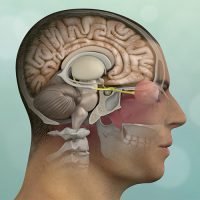Peripheral Nerve Surgery

Expert Peripheral Nerve Surgery by the Best Neurosurgeon, Dr. S. Narayan: Restoring Function and Relieving Pain
Unlike the brain and spinal cord, peripheral nerves have an intrinsic ability to heal and regenerate. With timely repair, even severely injured peripheral nerves can make a full recovery. The purpose of peripheral nerve surgery is to restore motor and sensory nerve functions while also reducing pain and disability. This type of surgery may be recommended for the following conditions:
- Peripheral nerve injury resulting in significant weakness or numbness, with no response after three months of home treatment.
Persistent pain due to peripheral nerve entrapment syndrome is not relieved by conservative measures.
- Peripheral nerve tumors.
When would I require surgery on my peripheral nerves?
When peripheral neuropathy (nerve damage) causes pain and other symptoms that do not resolve with medications, physical therapy, or first aid treatments such as nerve blocks, Dr. S. Narayan, the Best Peripheral Nerve Surgeon in Jamshedpur, recommends surgery. Peripheral nerves can suffer damage from a variety of causes, including injury, medication side effects, nerve compression, autoimmune disorders, and medical conditions such as diabetes.
Peripheral nerve surgery is a common procedure performed by Dr. S. Narayan for ailments including:
- The condition is known as carpal tunnel syndrome.
Cubital tunnel syndrome
Ulnar neuropathy
Malignancies of peripheral nerves
Thyroid gland tumors
Brachial plexopathy
Your diagnosis will determine the kind of surgery you require as well as the symptoms you encounter.
Which signs point to the need for peripheral nerve surgery?
Sensory nerves
Sensory nerves are responsible for detecting sensations such as pain, temperature, pressure, and other stimuli, which they transmit to the brain. Damage to these nerves can cause local or radiated pain, tingling, burning, or numbness (loss of sensation).
Nerves of the motor
Motor nerves control voluntary muscles, including activities such as walking and speaking. When these nerves become damaged, it can cause problems like painful cramps, muscle twitches, weakness, and muscle loss.
Nerves that control the autonomic
Autonomic nerves oversee essential bodily functions that operate involuntarily, such as heart rate, hormone regulation, breathing, body temperature, and digestion. Dysfunction in these nerves can manifest in various symptoms, such as rapid heartbeat, excessive perspiration, or gastrointestinal issues.
What kind of surgery on peripheral nerves would I require?
Not all nerve injuries require surgical intervention; peripheral nerves have the ability to heal on their own with conservative treatment. However, in cases requiring surgery, the expertise of Dr. S. Narayan, recognized as the Best Peripheral Nerve Surgeon in Jamshedpur, becomes indispensable. Given the delicate nature of peripheral nerve surgery, precision and efficiency are paramount to achieving optimal results.
Peripheral nerve surgery can take several forms, such as:
What kind of surgery on peripheral nerves would I require?
Elimination of tumors
Getting rid of the tumor is no easy task, as it needs to be done without damaging nearby nerves. Dr. S. Narayan uses advanced microsurgical techniques to carefully monitor nerve activity during the procedure to safely remove the tumor while maintaining nerve function.
Discharge of nerves
Entrapment neuropathy occurs when a nerve undergoes compression, which can potentially be caused by tumors or injuries. However, the most prevalent conditions are carpal tunnel syndrome and cubital tunnel syndrome, respectively. Dr. S. Narayan uses minimally invasive surgical techniques to relieve this compression or restore the affected nerve. Decompression involves freeing the nerve from shrinking tissue by cutting or separating it. If you are suffering from peripheral neuropathy, you can consult Dr. S. Narayan, the Best Peripheral Nerve Surgeon in Jamshedpur.
Frequently Asked Questions
The nerves of the peripheral nervous system facilitate communication between the body and the brain, thereby managing various involuntary bodily functions such as breathing, blood circulation, and heartbeat. It also involves the control of sensory information and voluntary movement.
The nervous system performs its assigned functions within milliseconds. It consists of two main divisions: the central nervous system, which includes the spinal cord and brain, and the peripheral nervous system, which includes the spinal cord and nerves that come out of the brain.
Thread-like structures known as nerves originate from the brain and spinal cord. These nerves serve as the genuine extensions of neurons, which are the fundamental functional units of our nervous system responsible for conducting electrochemical signals. The interconnection between neurons and nerves is vital for the proper functioning of the nervous system.
The primary roles of the peripheral nervous system include:
- Transmitting motor responses to all voluntary striated muscles in the body.
Relaying external environmental information to the brain and spinal cord.
Orchestrating essential bodily responses such as walking, chewing food, and facial expressions.
Regulating autonomous functions such as heart rate and digestion.
